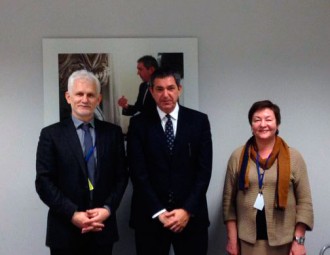Zhanna Litvina and Ales Bialiatski discussed human rights situation in Belarus with EU officials
 photo from @fidh_eu twitter
photo from @fidh_eu twitter
Ales Bialiatski, Chair of the Human Rights Center "Viasna" and Zhanna Litvina, ex-chair of the Belarusian Association of Journalists have arrived on a working visit to Brussels on February 2.
On February 2-3 they held meetings with Helga Schmid, Deputy Secretary General for the European External Action Service, and Stavros Lambrinidis, EU Special Representative for Human Rights, as well as a number of ambassadors of European countries to the European Union and other EU representatives in charge of human rights issues and European neighborhood policy.
During the meetings situation with human rights in Belarus was discussed. Belarusian human rights defenders said that the release of six political prisoners in August 2015 was not followed by any other positive developments in the field of human rights and democracy, while the presidential elections in October 2015 was marred by gross violations and falsifications, the Human Rights Center "Viasna" informs.
So far, the country’s authorities have failed to reply to an open letter by the Belarusian human rights organizations of December 2015, which called to immediately launch democratic reforms and put an end to the political persecution of civil society and political activists, to allow the registration of blacklisted NGOs and political parties without political censorship, to create safe conditions for the return of political refugees to the country, to stop the persecution of independent journalists and democratic media, and to introduce a moratorium on the death penalty.
Moreover, representatives of civil society and journalists continue to be subjected to harassment, courts still hand down death sentences, and non-governmental organizations face repeated denials of registration. Human rights activists pointed out that the problems with human rights and democratic freedoms in Belarus are of systemic nature.
Guided by the concerted position of the Belarusian human rights organizations, Ales Bialiatski and Zhanna Litvina suggest that the level of monitoring the human rights situation in Belarus should not be reduced and constant political pressure on the Belarusian authorities be preserved in order to expand the country’s democratic community. The activists called on the European Union to announce a list of priority measures that the Belarusian authorities are expected to take, and to agree on a ‘road map’ for democratic changes in the country.
The visit takes place on the eve of a scheduled decision on EU sanctions against Belarusian officials responsible for human rights violations and electoral fraud. The sanctions were suspended for four months at the end of October 2015. The question will be discussed by the EU Council on Foreign Relations on February 15.
-
03.01
-
07.10
-
22.09
-
17.08
-
12.08
-
30.09



























